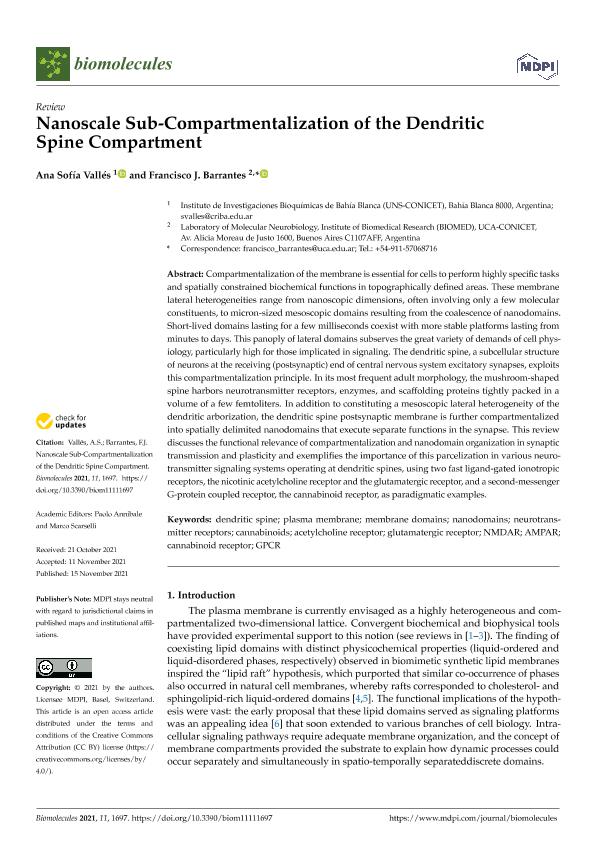Mostrar el registro sencillo del ítem
dc.contributor.author
Valles, Ana Sofia

dc.contributor.author
Barrantes, Francisco Jose

dc.date.available
2022-09-28T15:12:31Z
dc.date.issued
2021-11
dc.identifier.citation
Valles, Ana Sofia; Barrantes, Francisco Jose; Nanoscale Sub-Compartmentalization of the Dendritic Spine Compartment; MDPI; Biomolecules; 11; 11; 11-2021; 1-22
dc.identifier.issn
2218-273X
dc.identifier.uri
http://hdl.handle.net/11336/170763
dc.description.abstract
Compartmentalization of the membrane is essential for cells to perform highly specific tasks and spatially constrained biochemical functions in topographically defined areas. These membrane lateral heterogeneities range from nanoscopic dimensions, often involving only a few molecular constituents, to micron-sized mesoscopic domains resulting from the coalescence of nanodomains. Short-lived domains lasting for a few milliseconds coexist with more stable platforms lasting from minutes to days. This panoply of lateral domains subserves the great variety of demands of cell physiology, particularly high for those implicated in signaling. The dendritic spine, a subcellular structure of neurons at the receiving (postsynaptic) end of central nervous system excitatory synapses, exploits this compartmentalization principle. In its most frequent adult morphology, the mushroom-shaped spine harbors neurotransmitter receptors, enzymes, and scaffolding proteins tightly packed in a volume of a few femtoliters. In addition to constituting a mesoscopic lateral heterogeneity of the dendritic arborization, the dendritic spine postsynaptic membrane is further compartmentalized into spatially delimited nanodomains that execute separate functions in the synapse. This review discusses the functional relevance of compartmentalization and nanodomain organization in synaptic transmission and plasticity and exemplifies the importance of this parcelization in various neurotransmitter signaling systems operating at dendritic spines, using two fast ligand-gated ionotropic receptors, the nicotinic acetylcholine receptor and the glutamatergic receptor, and a second-messenger G-protein coupled receptor, the cannabinoid receptor, as paradigmatic examples.
dc.format
application/pdf
dc.language.iso
eng
dc.publisher
MDPI
dc.rights
info:eu-repo/semantics/openAccess
dc.rights.uri
https://creativecommons.org/licenses/by/2.5/ar/
dc.subject
ACETYLCHOLINE RECEPTOR
dc.subject
AMPAR
dc.subject
CANNABINOID RECEPTOR
dc.subject
CANNABINOIDS
dc.subject
DENDRITIC SPINE
dc.subject
GLUTAMATERGIC RECEPTOR
dc.subject
GPCR
dc.subject
MEMBRANE DOMAINS
dc.subject
NANODOMAINS
dc.subject
NEUROTRANSMITTER RECEPTORS
dc.subject
NMDAR
dc.subject
PLASMA MEMBRANE
dc.subject.classification
Biofísica

dc.subject.classification
Ciencias Biológicas

dc.subject.classification
CIENCIAS NATURALES Y EXACTAS

dc.title
Nanoscale Sub-Compartmentalization of the Dendritic Spine Compartment
dc.type
info:eu-repo/semantics/article
dc.type
info:ar-repo/semantics/artículo
dc.type
info:eu-repo/semantics/publishedVersion
dc.date.updated
2022-09-09T17:58:57Z
dc.journal.volume
11
dc.journal.number
11
dc.journal.pagination
1-22
dc.journal.pais
Suiza

dc.journal.ciudad
Basilea
dc.description.fil
Fil: Valles, Ana Sofia. Consejo Nacional de Investigaciones Científicas y Técnicas. Centro Científico Tecnológico Conicet - Bahía Blanca. Instituto de Investigaciones Bioquímicas de Bahía Blanca. Universidad Nacional del Sur. Instituto de Investigaciones Bioquímicas de Bahía Blanca; Argentina
dc.description.fil
Fil: Barrantes, Francisco Jose. Pontificia Universidad Católica Argentina "Santa María de los Buenos Aires". Instituto de Investigaciones Biomédicas. Consejo Nacional de Investigaciones Científicas y Técnicas. Oficina de Coordinación Administrativa Houssay. Instituto de Investigaciones Biomédicas; Argentina
dc.journal.title
Biomolecules
dc.relation.alternativeid
info:eu-repo/semantics/altIdentifier/url/https://www.mdpi.com/2218-273X/11/11/1697
dc.relation.alternativeid
info:eu-repo/semantics/altIdentifier/doi/https://doi.org/10.3390/biom11111697
Archivos asociados
